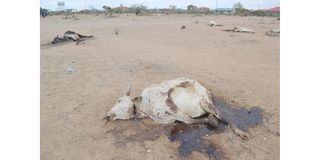Stench from animal carcasses puts residents on edge

Cattle carcasses at Kasarani Estate in Hola, Tana River County.
It is midday and the sun is extremely hot in Tana River County.
Flies buzz around the carcasses of cattle as locals struggle to stifle the awful stench by covering their noses with handkerchiefs and clothes.
With the ongoing drought, there has been a shortage of water and food for animals and the carcasses of those that have starved to death now litter the entry to Tana River County.
Along the Minjila-Garissa highway, travellers must cover the 230km journey with the windows of their vehicles shut as they watch scavengers tear into the smelly carcasses by the roadside.
Also affected are residential areas in Hola and Garsen towns. Residents say they will not take it anymore, arguing that county officials have failed to properly dispose of the carcasses.
"The whole town stinks. One cannot walk 10 metres without encountering a fresh carcass and by the time you get to your destination, your stomach is swollen with gas," says Abdi Mohammed.
Mr Mohammed said the county inspectorate, the department of livestock and officers from the public health have failed in their duty.

Carcasses at Umoja Estate in Galole, Tana River County.
He noted that the inspectorate should be at the frontline collecting carcasses, while public health officers should ensure residential areas are free from the stench.
"We need a conducive environment to live in, this is not it. Some families are forced to burn incense to clear the odour so that they can sleep at night or even spend time in their homes at daytime," he said.
In Hola, more people are abandoning the carcass-filled Kasarani estate as their appeals to county officials fall on deaf ears.
"We have tried the best we can. We have abandoned old routes and formed new ones but each day a cow must die somewhere," said Mariam Hassan.
Wild animals troop into residential areas to feast on the carcasses.
Residents described encounters with hyenas and jackals as early as 10pm, making nights more dangerous.
"Our kids are even afraid of going to school in the morning because all night they have to contend with giggling hyenas and howling jackals. This situation is getting out of hand," says Margaret Habona, a homeowner.
If the carcasses are not removed, residents lamented, they might become disease sources.
"If they are washed about by rainwater, the result might be devastating, and even the water we drink will not be safe," said Jonathan Mwero.
They urged county officials to collect the carcasses and burn them.
They also appealed to the public health department to disinfect areas with rotten carcasses to remove the smell.
County Inspectorate Commissioner-General Omar Dhadho said his department would work with health officials to tackle the problem.
"It is a genuine concern and we look forward to addressing it with the public health team as quickly as possible to avoid further frustrations, " he said.





